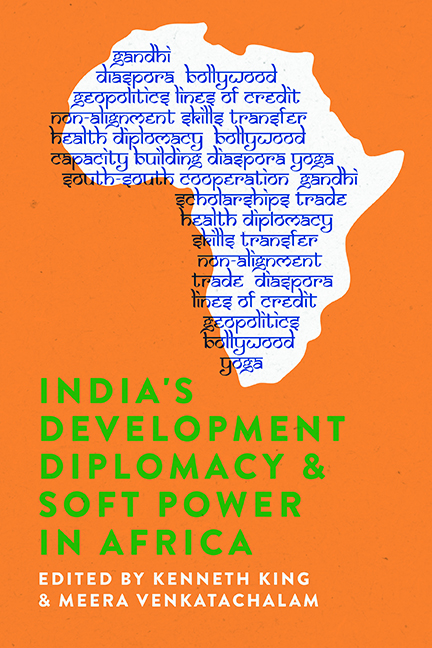Book contents
- Frontmatter
- Contents
- Notes on Contributors
- Acknowledgements
- List of Abbreviations
- Glossary
- Introduction: India–Africa Now: Changing Imaginaries and Knowledge Paradigms
- Part 1 The Geopolitical Imaginary and Soft Power
- Part 2 The Indian Political Right and the Reconfiguration of Soft Power in Africa
- Part 3 Capacity Building: Shifting Modalities and New Knowledgescapes
- Part 4 Skilling, Knowledge Transfer and Indo-African Interactions
- Conclusion: Reflections on India–Africa Studies, Development Cooperation and Soft Power
- Index
4 - Modi and the Mahatma: The Politics of Statues and the Saffronisation of India–Africa Relations
Published online by Cambridge University Press: 26 May 2022
- Frontmatter
- Contents
- Notes on Contributors
- Acknowledgements
- List of Abbreviations
- Glossary
- Introduction: India–Africa Now: Changing Imaginaries and Knowledge Paradigms
- Part 1 The Geopolitical Imaginary and Soft Power
- Part 2 The Indian Political Right and the Reconfiguration of Soft Power in Africa
- Part 3 Capacity Building: Shifting Modalities and New Knowledgescapes
- Part 4 Skilling, Knowledge Transfer and Indo-African Interactions
- Conclusion: Reflections on India–Africa Studies, Development Cooperation and Soft Power
- Index
Summary
Public monuments are never merely symbolic. They do matter. They are expressions of power and authority. They make claims to represent a community and are means through which communities express their values and collective past. More often than not, they quickly become part of the familiar landscape and we become oblivious to them. But there are times when historical monuments attract affective energies and become objects of political action and violent contestation. At the end of May 2020, the death in the USA of George Floyd at the hand of a police officer sparked a wave of ‘Black Lives Matter’ (BLM) protests across the world to demand racial justice and condemn police brutality. Statues commemorating colonial conquest and racial subjugation turned into objects of hatred and became targets of defacement. In the US the rage was mainly directed at Confederate monuments. But across Europe, protesters attacked the symbols of the continent's racist colonial past.
These protests come almost five years after the ‘Rhodes Must Fall’ Campaign of 2015 that resulted in the removal of the statue of Cecil Rhodes from the campus of the University of Cape Town. Only a year later, in September 2016, some lecturers and students of the University of Ghana, in Legon (Accra), signed a petition demanding the removal of a statue of Mohandas Karamchand Gandhi that had been gifted by the then Indian President Pranab Mukherjee only a few months earlier. Referring to a number of racist remarks that Gandhi had made about Black South Africans when he lived in South Africa (1893–1914), the petitioners claimed that Gandhi was a racist. They also drew attention to Gandhi's campaigns ‘against the efforts of the Dalits, The Black (sic) “Untouchables” of India’ and his acceptance of the hierarchical caste system, calling the gift ‘a slap in the face’ that undermined Ghana's ‘struggle for autonomy, recognition and respect’ (Change.org 2016). The controversy quickly gained international attention partly because it grated against the common representation of Gandhi as a symbol of peace and civil disobedience that inspired anti-colonial and civil rights movements even after his death, but also because it was one of many protests on university campuses in Africa and elsewhere against the enduring symbols of colonial oppression.
- Type
- Chapter
- Information
- India's Development Diplomacy and Soft Power in Africa , pp. 79 - 98Publisher: Boydell & BrewerPrint publication year: 2021



